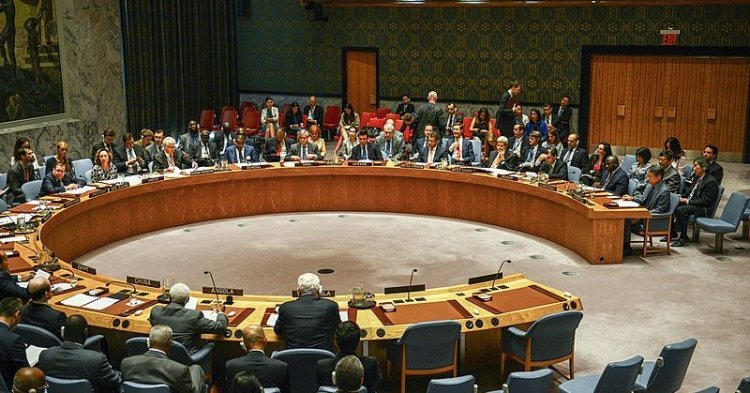The crisis in Ukraine has exposed the weaknesses of international law, undermining the principles of Westphalia: the concept of sovereign rule; liberty of faith; and equality among leaders. Such ideals, articulated during the formation of the United Nations, have failed to acknowledge the concerns of “exertion of force”. The realist concept "Might is Right’’ defines and often reconstructs international law and its conventions in accordance with its own strategic interests. For instance, concerns over sovereign rights claims in Northern Ireland, Catalonia, and Balochistan.
The British Jurist Thomas Erskine said, "International law is the vanishing point of jurisprudence”. Transnational rule and formal international treaties such as International Convention on Civil and Political Rights (ICCPR) and the International Covenant on Economic, Social and Cultural Rights (ICESCR) do express some authority, but lack the power to enforce anything without taking sovereign power into account.
As the concept of morality and western chauvinism dominates - where categorical exertion trumps the concept of treaties addressing the concerns of other regions - the legitimacy of international law will again vacant the seat for international anarchy. Thus, giving an opportunity to the sovereign to defy the rigid and western-centric institutional norms and tenets, not acknowledging their queries and concerns.
The Geneva convention, outlining the norms for combatants’ behavior during war, was laid out by the International Criminal Court (ICC). They established tenets based upon the four treaties and three additional protocols as ethical and legal international standards during the war. It also laid down the essential framework on treatment of non-combatants, prisoners of war, monitoring of chemical weapons, biological weapons and other illegal weapons prohibited during wars (The Hague convention and Geneva protocol govern, respectively).
The Geneva convention refers to:
- I) Wounded and sick soldiers on land and their access to medical and religious personnel
- II) Wounded and sick soldiers in the sea during the war
- III) Prisoner war, general protection such as humane treatment, maintained and equality across - prisoners, conditions of captivity, questioning and evacuation, right to religion.
- IV) The protection of civilians, including those in the occupied territory .
The necessity for an additional protocol emerged when the states used residential areas for bombing to attain aerial superiority during the war. Although, the additional protocol of 1977 includes detailed provision for humanitarian aid. Nevertheless, it fails to accommodate such legal principles with the realistic aspirations of the nation. Therefore, it questions the very legitimacy of the United Nations and such mammoth conventions which are now concluded as reminiscent of the League of Nations. As the latter failed to prosecute the Allied bombing during war, especially the 1945 Tokyo bombing, the former failed to stop NATO bombing Yugoslavia and Serbia in 1990s.
As the modern system of transnational governance prevails, new methods of pursuing gunboat diplomacy prevail through the misuse of the United Nations Charter, Chapter VII: Action concerning Threats to the Peace, Breaches of the Peace, and Acts of Aggression, Article 51; It is stated that the Nation could intervene if there is a threat to the right of self-determination while the rule of all will not impair it to and protect itself from armed attack. Such liberty allowed Russia to manifest his war ambition through this justification.
The panacea lies in the adoption of a new governance model deriving its idea from the Transnational divisions of Power within The European Union. This could prevent future wars by initiating dialogues at the Transnational level and in case the matters escalate, the U.N. will intervene. This state-centered approach to resilience in policymaking and agreements will ensure prolonged peace through dialogues and treaties.
The constant setbacks over the prevention of wars for which the United Nations initially constituted as mentioned in “Article 2, Paragraph 4, which states that all member states shall refrain from the threat or use of force against the territorial integrity”. The recent invasion of Ukraine by the Russian Federation does indeed reveal the flaw with the United Nations Security Council resolutions where a backdoor military intervention through unrealistic situations allows for interpretation by the aggressor with pretexts to escalate a war. The prevention of pretextual warfare and promotion of cooperation against false military intervention provides three points:
First is the subdivision of the U.N. Security Council (UNSC) into eight regional groups: Asia, Europe, Australia, Africa, America, Middle East, Latin America and Small Islands. All the issues which can be resolved without UN intervention will be addressed here, enabling dialogue among the belligerent groups. If the dialogue concludes is unsuccessful, the issue is transferred to the UNSC, where the five parties will discuss the security matter.
Second, to attain this system, it is mandatory to end all the temporary rotational member’s seats so that the balance can be attained. Such settings will Simultaneously nullify the Veto effects over regional groups constituted in the first recommendation. By doing this, the nations will refrain from going to the UN for resolution as VETO will not be applicable over the Group resolution. (Exception: Not in contradiction with the established international law and UN Charter)
Third, amendments regarding the UN Charter Article 15 do not provide the scope for some resolutions by the General Assembly and limit its sphere of influence to mere recommendation and advisory boards. Amending Article 15 and bringing the legally binding provision will halt the operations conducted worldwide against or in violation of the UN Charter and Human rights, including international law.
This divisional structure found its trace in the European Union: where binding treaties define the scope of intervention and restrictions; where the supranational power cannot act beyond the rules the member state agreed upon; where the state cedes some power to the supranational body. This simultaneously keeps state interest aligned with the institutional objective of determining and influencing the domestic policy by the state’s consent rather than the group’s interest.
Article 7 of the Treaty of the European Union states that as a preventive measure, the European Council will initiate dialogues with states which are found to be on the verge of breaching/violating Article 2 of the Treaty of European Union. Article 7 Paragraphs 2 and 3 lay down corrective measures in the event of a “serious and persistent breach”, such as a suspension of voting rights, and sanctions. This is known as the ‘nuclear button’ due to the high risk of its adverse effects. Despite this, the question arises: why is it needed? And the answer is, the consistent failure of the UN in preventing wars.
The power to enforce this and prevent war can only be triggered after the unanimous consent of the five member states. At the same time, it does have a special clause in Resolution 377, “Uniting for Peace”, meaning that when a deadlock emerges amongst the member states, the General assembly gains the power to intervene. The Security Council has referred most cases, but has not done so since 1982.
By this hierarchy, the development state could act and come to an agreement through dialogues, and at the moment when the diplomatic mission fails, the UN, with its legal binding treaties and Charter, could intervene and correct the flaw. To attain these developments and goals, three key players must exhibit their full strength in performing the aforementioned duties.


Follow the comments: |
|
